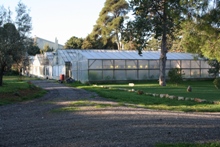Laboratory of EFFICACY CONTROL OF PESTICIDES
Activities
The current activities of the Laboratory focus on the evaluation of the efficacy of PPPs for national and South European Zone authorization and on its own research projects. The evaluation of PPPs’ efficacy promotes their rational use and informative labeling, equipping both the producer of agricultural products and the agronomist with the necessary knowledge on the range of action and conditions of the PPPs’ proper use under local conditions. In addition to the evaluation of PPPs, the Laboratory of Efficacy Control of Pesticides conducts research into the development of Low Input Crop Management (LCM) Systems and the development of integrated or alternative systems to address crop protection problems, according to the rules and criteria governing the most up-to-date approaches to sustainable agriculture and LCM systems.
Main fields of current research
The main areas of the Laboratory’s research activity are related to:
- Study of conventional and alternative control methods for diseases and pests by using chemical PPPs (or others of natural origin and low-risk) in conjunction with tolerant varieties, beneficial insects, mass trapping, etc.
- The study of epidemiological characteristics of diseases, such as powdery mildew and grey mould of greenhouse-grown tomatoes.
- Studies on the negative impacts of PPPs on beneficial arthropods, in relation to their use as biological control agents in integrated management of crops (laboratory bio-assays).
- Study of the biology, behavior and interactions of beneficial arthropods (parasitoids and predators) with their hosts (insect pests in crops), as well as between various species of parasitoids and predators. Experimentation on the interactions between parasitoids focuses mainly on super-parasitism and on multi-parasitism, in relation to the effectiveness of parasitoids as biological control agents.
Training
The Laboratory of Efficacy Control of Pesticides is actively involved in the training of students from affiliated universities. Undergraduates come to the Scientific Directorate to gain practical experience or for the implementation of their final-year projects. Postgraduate students are able to undertake their research projects, leading to the attainment of MSc and PhD degrees. The Scientific Directorate also trains subject-matter professionals, including farmers, agronomists and analysts.
Scientific laboratory staff
Filitsa Karamaouna, PhD, Research Director, Head of the Laboratory
Athanasios K. Giatropoulos, PhD, Agronomist-Entomologist, Senior Researcher
Leonidas P. Economou, PhD, Agronomist, Senior Researcher
Philippos N. Mylonas, PhD, Agronomist-Weed Scientist, Research Scientist
Theodora Nikolopoulou, MSc, Agronomist, Research Scientist
Charikleia Kavroumatzi, MSc, Agronomist, Scientist
Maria Lykogianni, MSc,PhD,
Agronomist
Myrto Barda, MSc,PhD, Agronomist-Entomologist
Maria Samara, MSc, Agronomist
Argyro Ampatzi, MSc, Agronomist
Iro Pardavella, MSc, Agronomist
Violeta Efstathiou, MSc, Agronomist

